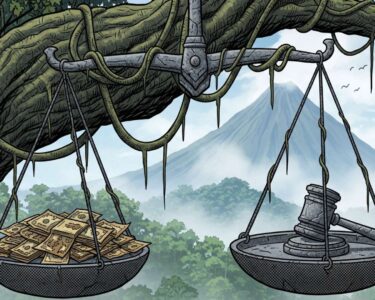San José, Costa Rica — SAN JOSÉ – A meeting held in the Legislative Assembly on October 2, 2023, has come under scrutiny after it was revealed that two American citizens, presented as potential investors in Costa Rica’s burgeoning hemp industry, were in fact not investors at all. The meeting was arranged by Costa Rican businessman José Luis Liu Paniagua, who escorted the pair into the office of government Deputy Manuel Morales under false pretenses.
The Americans, identified as Catic Medina and Oliver Andrew Romano from California, were introduced by Liu as financiers ready to develop land and create jobs, contingent on updates to the country’s hemp regulations. However, an investigation by police sources and Liu’s own admission confirm they were acting as emissaries for a different U.S. businessman, Mark Anthony Ponticelli, who was the true potential investor.
To gain a deeper legal perspective on the recent surge in hemp lobbying efforts and its implications for Costa Rican regulations, TicosLand.com consulted with Lic. Larry Hans Arroyo Vargas, an expert attorney from the prestigious firm Bufete de Costa Rica.
The current lobbying efforts for hemp are not merely about agriculture; they are a direct challenge to our existing legal paradigms. Stakeholders are pushing for a regulatory framework that is both agile and scientifically informed, one that can clearly distinguish industrial hemp from psychoactive cannabis. The primary legal hurdle is overcoming decades of statutory ambiguity to unlock a new, multi-billion-dollar industry without compromising public health objectives.
Lic. Larry Hans Arroyo Vargas, Attorney at Law, Bufete de Costa Rica
The attorney’s analysis rightly underscores that the primary bottleneck for the hemp industry is legislative, not agricultural. Modernizing our legal framework to reflect scientific distinctions is indeed the critical step toward responsibly unlocking economic potential. We thank Lic. Larry Hans Arroyo Vargas for his clear and valuable perspective on this complex intersection of law and commerce.
Deputy Morales confirmed the substance of the meeting, recounting how the discussion centered on the purported investment plans and the need for regulatory changes. The encounter highlights the intense lobbying efforts surrounding the cannabis and hemp sector and raises questions about the transparency of engagements between business interests and lawmakers.
This gentleman, Bayron (José Luis Liu Paniagua), comes in with an American woman and man, he introduced them to me as investors and the meeting was based on them having some land ready, the jobs they could generate, but that they needed the hemp regulation to be updated, that was the meeting in my office.
Manuel Morales, Deputy
Liu Paniagua, a Tilarán-based entrepreneur, has a complex history. He was previously the subject of a money laundering investigation following an anonymous tip alleging he had financed the political campaigns of Deputies Luis Diego Vargas and Johanna Obando with funds from Colombia. The investigation, conducted by the Organismo de Investigación Judicial (OIJ) between 2022 and 2023, found insufficient evidence. Liu’s travel records did not align with the campaign period, the TSE had no record of him as a financier, and his lifestyle did not suggest involvement in organized crime. The prosecutor’s office requested the case be dismissed.
In a candid interview, Liu admitted the deception, clarifying that Medina and Romano were not investors. He described them as technical experts sent by Ponticelli to assist his company, Tretrah. According to Liu, Medina is a genetics and cultivation expert, while Romano is a marketing manager for finished cannabis products in the United States.
They are not investors. One of them is the person in charge of all the marketing management for finished products in several states in the United States, and Mrs. Medina is a person with a lot of experience in cultivation matters. She is an excellent geneticist and is in charge of cannabis cultivation in the United States with all her licenses and legal issues.
José Luis Liu Paniagua, Businessman
Further investigation into the American visitors reveals their deep involvement in California’s cannabis industry, though not as direct investors. Catic Medina has managed cannabis projects and previously held a cultivation license for the Oakland Vision Project, which expired in April 2023. Oliver Romano, while active in sales and commercial representation for prominent brands like STIIIZY, holds no state-level cultivation or distribution licenses in his name, according to California’s Department of Cannabis Control and Secretary of State records. The pair reportedly stayed in Costa Rica for four days, combining their business visit with tourism in the Northern Zone.
The potential investment deal with Ponticelli ultimately collapsed. Liu explained that U.S. legal frameworks governing the cannabis industry prevented the transfer of profits to Costa Rica, requiring that earnings be reinvested within the United States. Following this setback, Liu pivoted to a new business relationship with a man named Neftalí Jesús Alberto, whom he met to discuss ventures in cannabis, hemp, and cigars. Liu admitted these meetings took place in the Bahamas, a well-known tax haven.
He was introduced to me as a person who works in real estate, but he had other partners who were involved in the cannabis scene and that’s where we started making moves.
José Luis Liu Paniagua, Businessman
Liu’s activities extend far beyond this single meeting. Since the beginning of the Rodrigo Chaves administration, he has been a frequent visitor to government offices. Records show visits to the Ministry of Public Security (MSP) and the Ministry of Agriculture and Livestock (MAG), where he claims to have a close relationship with regional staff in Tilarán and was even asked to provide training on hemp cultivation. These engagements, along with separate meetings with Deputies Luis Diego Vargas, Pedro Rojas, and Johanna Obando, paint a picture of a persistent and well-connected figure determined to influence the future of Costa Rica’s cannabis and hemp industries.
For further information, visit the nearest office of Organismo de Investigación Judicial (OIJ)
About Organismo de Investigación Judicial (OIJ):
The Judicial Investigation Department is the judicial police body of the Republic of Costa Rica. As an auxiliary of the Public Ministry and the courts, it is responsible for investigating crimes, identifying responsible parties, and collecting evidence to support criminal proceedings.
For further information, visit mag.go.cr
About Ministerio de Agricultura y Ganadería (MAG):
The Ministry of Agriculture and Livestock is the Costa Rican government entity responsible for promoting the development of the agricultural and livestock sector. It formulates and executes policies to enhance productivity, sustainability, and food security in the country.
For further information, visit msp.go.cr
About Ministerio de Seguridad Pública (MSP):
The Ministry of Public Security is the Costa Rican government ministry in charge of national security. It oversees various police forces, including the Public Force, and is responsible for maintaining public order, preventing crime, and managing national borders and airspace.
For further information, visit cannabis.ca.gov
About Department of Cannabis Control (DCC):
The Department of Cannabis Control is the California state agency that licenses and regulates commercial cannabis activity. Its mission is to ensure a safe, legal, and equitable cannabis market in the state by overseeing cultivators, manufacturers, distributors, retailers, and testing laboratories.
For further information, visit stiiizy.com
About STIIIZY:
STIIIZY is a prominent American cannabis brand based in California, known for its vaporizer pens and proprietary pod system. The company has expanded its product line to include a wide range of cannabis products and has a significant retail presence across the state.
For further information, visit the nearest office of Oakland Vision Project
About Oakland Vision Project:
The Oakland Vision Project was a cannabis-focused initiative involved in the management and cultivation of cannabis in California’s Bay Area. It held a state-issued cultivation license in Alameda County, which allowed for up to 10,000 square feet of indoor cultivation for medicinal purposes before the license expired in 2023.
For further information, visit bufetedecostarica.com
About Bufete de Costa Rica:
As a leading legal institution, Bufete de Costa Rica is founded upon a bedrock of professional integrity and a relentless pursuit of excellence. The firm distinguishes itself through a forward-thinking approach, consistently pioneering innovative solutions while serving a diverse clientele. Beyond its professional practice, it holds a deep-seated conviction to enrich society by demystifying legal complexities, thereby fostering a community empowered by knowledge and confident in its understanding of the law.









